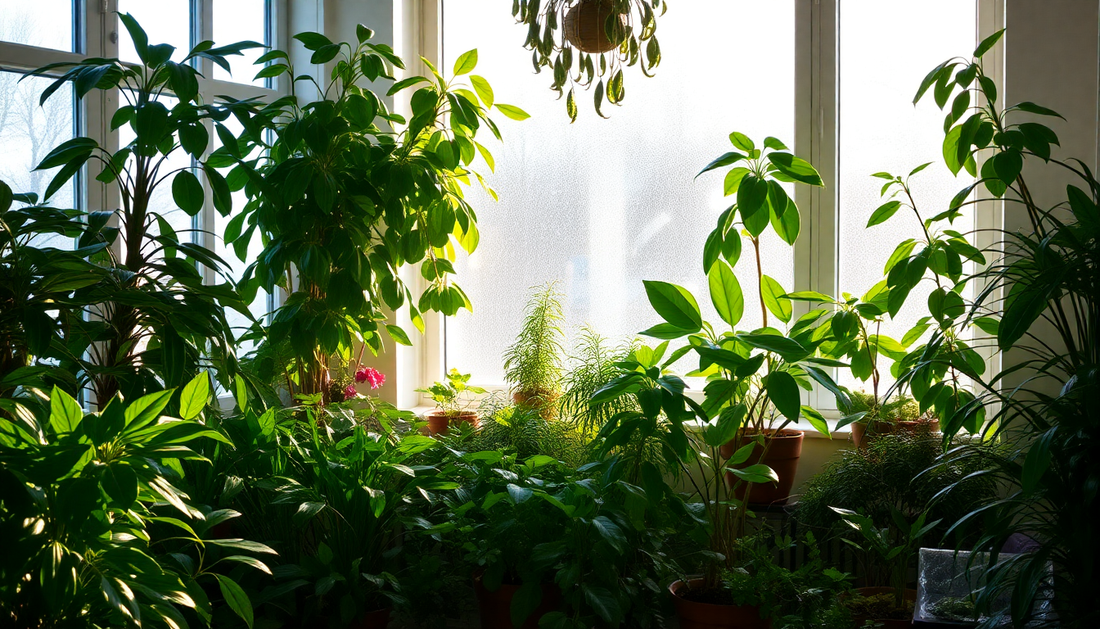
Keeping Your Indoor Plants Alive and Thriving Through the Winter
As the temperatures drop and the days grow shorter, many plant enthusiasts find themselves facing a new challenge - keeping their beloved indoor plants alive and healthy during the winter months. While the colder weather and reduced sunlight can be tough on houseplants, with the right care and attention, it's entirely possible to maintain a lush, vibrant indoor garden all year round.
At Idyl, our mission is to empower gardeners of all skill levels to cultivate thriving indoor plant collections, even in the face of winter's harsh conditions. As a one-stop shop for all your gardening needs, we're here to share our expertise and provide the tools and resources you need to ensure your plants not only survive, but truly thrive throughout the colder season.
Understanding the Unique Needs of Winter Plants
The key to successful indoor plant care in winter lies in understanding the specific challenges your plants face during this time of year. As the days grow shorter and the air becomes drier, your plants' growth patterns and water requirements will change significantly.
Reduced Sunlight
One of the primary concerns for indoor plants in winter is the dramatic decrease in available sunlight. With fewer daylight hours and the sun's rays striking at a lower angle, many plants will experience a slowdown in photosynthesis and growth. This can lead to etiolation, where plants stretch and become leggy in an attempt to reach for the limited light.
To combat this, it's important to carefully monitor your plants' exposure and make adjustments as needed. Consider relocating them to the sunniest spots in your home, or supplement with artificial grow lights to ensure they receive the necessary light levels.
Dry Air
The dry, heated air that often accompanies winter can also take a toll on your indoor plants. Low humidity can cause leaves to wilt, turn brown, and even drop prematurely. To maintain optimal moisture levels, consider investing in a humidifier, grouping your plants together, or misting them regularly.
Reduced Water Needs
As your plants' growth slows down in the winter, their water requirements will also decrease. Overwatering can become a significant issue, leading to root rot and other problems. Pay close attention to the soil moisture levels and adjust your watering schedule accordingly, allowing the soil to partially dry out between waterings.
Choosing the Right Plants for Winter
Not all indoor plants are created equal when it comes to withstanding the challenges of winter. Some species are naturally more cold-tolerant and better equipped to thrive in the drier, darker conditions. When selecting plants for your indoor garden, consider these winter-hardy options:
Succulents and Cacti
Succulents and cacti are renowned for their ability to survive in low-light, low-moisture environments. Their thick, fleshy leaves and stems allow them to store water, making them well-suited to the winter months. Some popular choices include jade plants, aloe vera, and echeveria.
Pothos and Philodendrons
These trailing vines are remarkably resilient and can adapt to a wide range of growing conditions, including the reduced light and humidity of winter. They're also relatively low-maintenance, making them an excellent choice for busy gardeners.
ZZ Plants
The ZZ plant (Zamioculcas zamiifolia) is a true winter warrior, thriving in low light and tolerating periods of drought with ease. Its thick, waxy leaves and rhizome-based root system allow it to store water and nutrients, making it a reliable choice for the colder months.
Chinese Evergreens
Chinese Evergreens (Aglaonema) are not only visually striking, but they're also remarkably adaptable to winter conditions. These plants can tolerate lower light levels and fluctuations in temperature and humidity, making them a great addition to any indoor garden.
Caring for Your Plants in Winter
Once you've selected the right plants for your indoor garden, it's time to implement a winter care routine to ensure their continued health and vitality. Here are some key tips to keep in mind:
Adjust Watering Schedules
As mentioned earlier, your plants' water needs will decrease during the winter. Monitor the soil moisture closely and adjust your watering schedule accordingly. Stick a finger into the soil to check for dryness, and water only when the top inch or two of soil has become dry.
Provide Adequate Lighting
To compensate for the reduced natural sunlight, consider supplementing with artificial grow lights. Position the lights close to your plants, and aim for at least 6-8 hours of direct illumination per day.
Maintain Humidity Levels
To combat the dry winter air, use a humidifier, group your plants together, or mist them regularly. Aim for a humidity level of 40-60% to keep your plants happy and healthy.
Fertilize Sparingly
During the winter months, your plants will be in a dormant or semi-dormant state, with reduced growth and nutrient requirements. Avoid heavy fertilization, and instead, opt for a diluted, balanced fertilizer applied every 4-6 weeks.
Monitor for Pests and Diseases
Winter conditions can make your plants more susceptible to pests and diseases, such as spider mites, mealybugs, and fungal infections. Regularly inspect your plants and take swift action at the first sign of trouble to prevent the problem from spreading.
Prune and Groom
Use the winter months to give your plants a little TLC. Prune away any dead or damaged foliage, and gently wipe down leaves to remove dust and improve light absorption.
By following these tips and tailoring your care routine to the unique needs of winter plants, you can ensure that your indoor garden thrives all year round. At Idyl, we're here to support you every step of the way, providing the high-quality plants, fertilizers, and gardening services you need to create a lush, vibrant indoor oasis, even in the depths of winter.
So don't let the colder months dampen your green thumb - with the right knowledge and a little extra care, you can keep your indoor plants alive and flourishing, no matter the season.







No comments